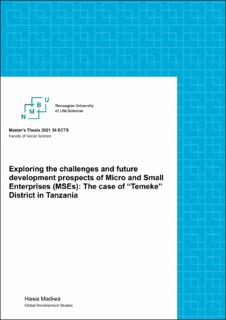| dc.description.abstract | The concept of entrepreneurship has become a very important agenda because it touches the life of the majority poor and promotes national and global economy at large. Most of the poor depend on this sector to run their life, including food, shelter, medication and so forth. The life of the Tanzanian is not assured or covered in any national health scheme Getting involved in Micro -small enterprises (MSEs)in Tanzania is not uncommon because many Tanzanians are not in the formal employment system, and this is not because they have no education, because even people with higher education have no jobs. The unemployment rate is still high in Tanzania. MSE's sector is plagued by many challenges, including capital, inadequate business training, infrastructure, and bureaucratic issues from among government officers. Small traders have been harassed all the time in their area and sometimes have been chased from their business area. Apart from harassment, access to credit is another issue for them to move forward. And that forced them to rely on families for economic and living support of which neither is guaranteed because most of these families are poor. Again, MSEs under supervision are gaining knowledge and skills, which lead to more possibilities in term of the local and international market The behavior of the city authorities of disregarding the MSEs and look down on them as poor people of less value has reduced their motivation resulting in loss of purpose and direction. Competitions among micro-small enterprises (MSEs) and Small-Medium Enterprise (SMEs) is another challenge observed. The medium sector is performing well due to many factors, including big capital, access to loan, the location of their business, and they have varieties of goods compare to micro-enterprises. Widespread corruption and thrust formations on several levels hamper independent companies' development by destroying the free local and EastAfrican market and resulting in dysfunctional market mechanisms. Overall, MSEs is an area with many challenges. That's why it is suggested that the government develop different policies instead of using the same approach while they are in two different sectors. Suppose the government does not formulate a separate policy between small traders (MSEs) and medium traders SMEs. In that case, the micro sector will continue to lag regarding progression and development, while medium and macro enterprises will benefit from the many opportunities and accessibilities. | en_US |

